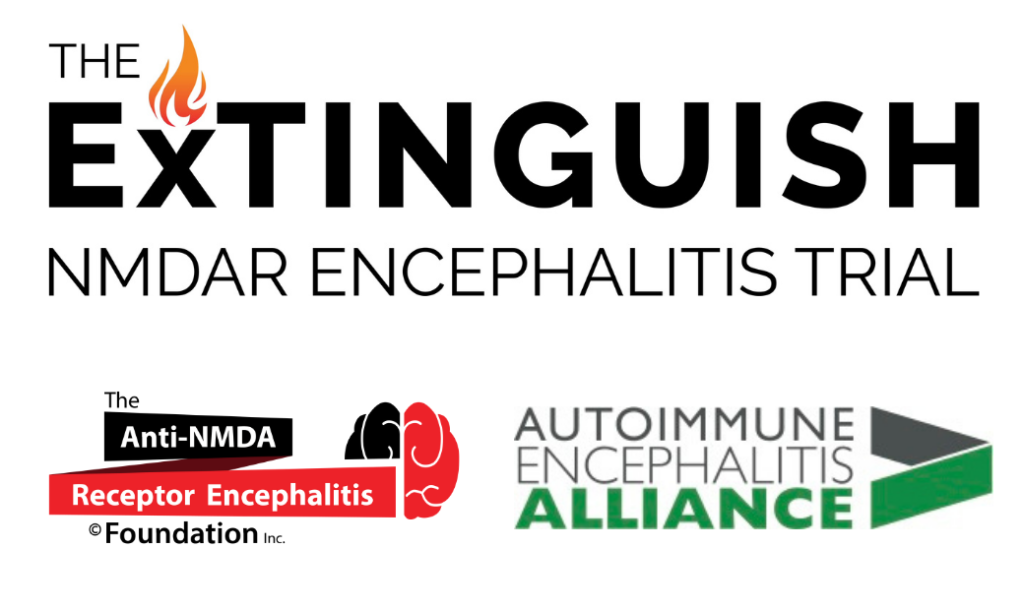Find a Clinical Trial
The ExTINGUISH trial study start date: March 30, 2022!
The ExTINGUISH Trial is a Phase-2b, Double-Blind, Randomized Controlled Trial to Evaluate the Activity and Safety of Inebilizumab in Anti-NMDA Receptor (NMDAR) Encephalitis and Assess Markers of Disease. This trial is the result of the dedication and hard work of Dr. Stacey Clardy, Dr. Maarten Titulaer, and Dr. Gregory Day.
The ExTINGUISH Trial will randomize 116 participants with moderate-to-severe NMDAR encephalitis to receive either Inebilizumab or placebo in addition to first-line therapies. Inebilizumab is a promising therapeutic monoclonal antibody for the treatment of NMDAR encephalitis. Inebilizumab not only depletes CD20+ B-cells, but also CD20- plasmablasts and plasma cells, resulting in robust and sustained suppression of B-cell expression.
The ExTINGUISH Trial will take place at 20 centers across the U.S. and two centers in Europe (Barcelona, Spain, and Rotterdam, the Netherlands). In order to be eligible to participate in the trial, you must have a new diagnosis of NMDAR Encephalitis that has not been treated with other immunotherapies.
If you are interested in learning more about the study or to find out if you are eligible, please contact ExTINGUISH@hsc.utah.edu or look up the study on clinicaltrials.gov (ClinicalTrials.gov Identifier: NCT04372615) This study is sponsored by NINDS and Horizon Pharmaceuticals.

Find out more about research and clinical trials specific for Autoimmune Encephalitis at: www.clinicaltrials.gov
ClinicalTrials.gov is a registry of clinical trials. It is run by the United States National Library of Medicine at the National Institutes of Health, and is the largest clinical trials database.
What are clinical trials?
Clinical trials are studies using human volunteers, looking at new ways to prevent, detect, or treat disease. The goal of clinical trials is to determine whether a new treatment is safe, and whether it works. No new drugs or treatments are approved for human use without a rigorous clinical trial to show safety and efficacy. Clinical research is conducted according to specific protocols, carefully planned to safeguard the participants’ health and answer specific research questions. A protocol describes the following:
- Who is eligible to participate in the trial
- The length of the study and what information will be gathered
- The objective, design, approach, statistical considerations and organization of the trial
A clinical study is led by a principal investigator (PI), who is often a doctor. The research team regularly monitors each participant’s health to determine the study’s safety and effectiveness. Clinical trials are conducted in “phases.” Each phase helps researchers answer different questions and is vital to provide sufficient evidence to receive approval from the U.S. Food and Drug Administration (FDA). In order for a treatment or therapy to become available to the public, it must pass through three phases. If the FDA approves, researchers will continue ongoing evaluation of safety and effectiveness.
How are trials supervised?
Clinical trials are closely supervised by regulatory authorities. Most clinical trials in the United States are approved and monitored by an Institutional Review Board (IRB). An IRB is an independent committee, often based in the treating hospital, that consists of physicians, statisticians, and members of the community who ensure that clinical trials are ethical and the rights of participants are protected.
What is informed consent?
Informed consent is the process of providing people the facts they need to know about a clinical trial before they decide to participate. The informed consent document describes the study’s purpose, duration, required procedures, risks, and potential benefits. The participant decides whether to sign the document. Informed consent is not a contract. You are free to withdraw from the study at any time, or to refuse particular treatments or tests.
Why do people participate in clinical trials?
There are many reasons people decide to join a clinical trial. People participate in trials to receive the newest treatment and to access additional care from the clinical trial team. Others want to help accelerate science as many studies are delayed or fail to get off the ground due to lack of volunteers.